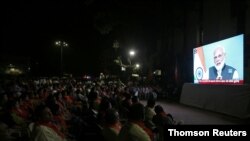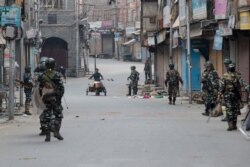Updated at 6:57 p.m. Aug. 8.
NEW DELHI - As Indian Kashmir remained in an unprecedented lockdown, Prime Minister Narendra Modi promised Kashmiris the beginning of a "new era" as a result of his government's decision to scrap the region's special status and bring it under New Delhi's control.
In an address Thursday on television and radio, Modi defended revoking the constitutional provision under which Kashmir could make its own laws, saying it had impeded its progress, given rise to terrorism and was used as a weapon by rival Pakistan to "instigate some people." India will now rid the region of "terrorism and terrorists," he said.
New Delhi blames Islamabad for fomenting a violent three-decade separatist insurgency in the disputed Himalayan region that both counties claim.
With Kashmir in a communications blackout for a fourth straight day, it was not clear how residents of India's only Muslim-majority region reacted to the Hindu nationalist leader's assurances of more development, jobs and better governance. Most Kashmiris could have heard his speech only on radio, as internet service and cable television network operations remain suspended.
But with scattered incidents of stone-throwing already being reported, despite curfew-like restrictions, there are fears that widespread protests could erupt in coming days. Anger and resentment are growing, not just at the decision to change Kashmir's seven-decade-old status but at the clampdown that has been more sweeping than ever before and virtually shuttered the region. Even reporters are finding it difficult to get information.
Police officers in riot gear are deployed every few meters on the streets in the capital, Srinagar, and barbed-wire checkpoints have been set up at major intersections.
A statement released Thursday by U.N. Secretary-General Antonio Guterres urged "maximum restraint" by both sides.
"The secretary-general also recalls the 1972 agreement on bilateral relations between India and Pakistan, also known as the Simla Agreement, which states that the final status of Jammu and Kashmir is to be settled by peaceful means, in accordance with the Charter of the United Nations," said Stéphane Dujarric, spokesman for the secretary-general.
300 in detention
Over 300 people including politicians, activists and some professors are in detention, according to reports trickling in. Kashmiris living outside the region say they have not been able to get in touch with families and relatives.
The prime minister, however, painted a picture of a better future for a region ripped apart by a violent Islamic insurgency that he said has claimed 42,000 lives. He promised new rail and road links and said that the region would choose its own representatives.
Although the main opposition Congress Party opposes the ruling Bharatiya Janata Party's decision to revoke Kashmir's special status, most other political parties support it. Modi has won praise in several quarters for taking a bold, decisive step that they say in the long run may address the alienation in Kashmir and integrate it with the rest of the country. Critics, however, fear that it will deepen anti-India sentiment and could fuel insurgency among people worried about opening up the region to the rest of the country.
Meanwhile, India downplayed Pakistan's decision to downgrade diplomatic ties and said changing the status of Kashmir was an internal affair and was aimed at developing the region. In a conciliatory statement, the Foreign Ministry urged Islamabad to reconsider its decision "so that normal channels for diplomatic communications are preserved."
Islamabad, infuriated by India's move to change Kashmir's status, has vowed to fight for the rights of Kashmiris.





